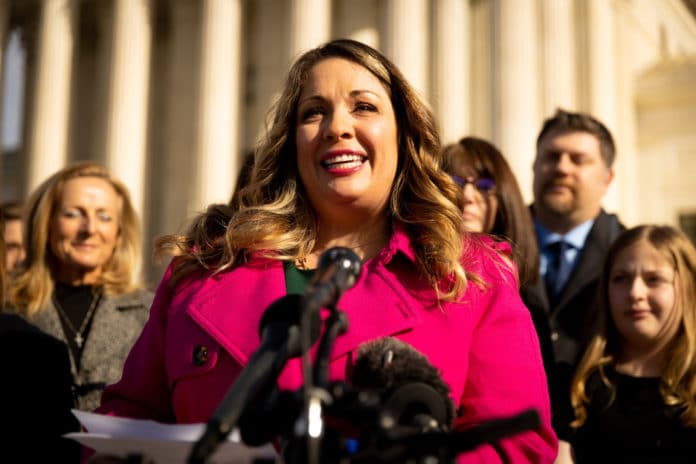
On Monday, Dec. 5, the Supreme Court heard a case that will shape the future of free speech.
In 303 Creative v. Elenis, graphic and web designer Lorie Smith is challenging a Colorado law that would compel her to create messages that go against her deeply held beliefs. After seeing how the Colorado Civil Rights Commission used this law to target Jack Phillips for refusing to create a cake celebrating a same-sex wedding, Smith realized that this law threatened her right to refuse to create messages she disagreed with. When the Supreme Court ruled in Phillips’ favor, it ruled on free exercise without addressing free speech. Smith’s case picks up where the Phillips case left off, asking the court to protect the right to speak and create freely.
Protecting the right to free speech includes protecting people from compelled speech. No one should be required to create a message that goes against their conscience and their beliefs. Under Colorado’s law, if Smith creates messages celebrating marriage between one man and one woman, she must also create messages celebrating same-sex unions. This is a direct violation of her beliefs about marriage. Smith would not even be allowed to put a statement on her website explaining what she believes.
Colorado’s compelled speech law is silencing her and saying that in order to create messages expressing her beliefs, she must also create messages that are directly contrary to her beliefs. This is not freedom — it is a form of censorship. When government officials police which designs an artist can agree to create and which she can say no to, everyone’s right to freely express what they believe is threatened.
Smith started 303 Creative because she wanted to be able to create messages celebrating and supporting causes she believes in. She has created websites and designs celebrating marriage and supporting children with disabilities, veterans, overseas missions, and animal shelters. She loves pouring her imagination and skills into her work, explaining, “Each and every one of my projects is a reflection of me.”

Smith has enjoyed working with clients from all walks of life, but she will not create all messages. Alliance Defending Freedom President and General Counsel Kristen Waggoner has pointed out that Smith “will decline any request — no matter who makes it — to create content that contradicts the truths of the Bible, demeans or disparages someone, promotes atheism or gambling, endorses the taking of unborn life, incites violence, or promotes a concept of marriage that is not solely the union of one man and one woman.”
During oral arguments, Colorado Solicitor General Eric Olson characterized Smith’s case as seeking to turn away gay clients, even if the website they requested was “identical” to the one requested by a heterosexual couple. However, this characterization completely misrepresents Smith’s case. Smith’s case is not about the client but about the message. She has worked with LGBT-identifying clients in the past, but she will not create a website that celebrates same-sex unions because doing so would go against her beliefs about marriage.
Olson’s characterization also misunderstands the nature of Smith’s work. Web designers can create off-the-shelf or “plug and play” website templates for users who want to build their own websites. These templates allow users to upload information and pictures themselves before launching a site. This is not the kind of work that Smith does. Instead, she creates unique designs and content for each client. Furthermore, it is not an “identical” message because the same expression can mean something different in different contexts. A wedding website for a man and a woman celebrates marriage as Scripture defines it. A wedding website for two men or two women celebrates a redefinition of marriage that is at odds with Smith’s faith.
Behind every work of art is a creator who has poured their skills and imagination into the finished product. Throughout history, creative work has served to express beliefs and advance ideas. Protecting the right to create freely is vital not only to the future of art, but also to the preservation of a free society where people are able to speak and act in accordance with their beliefs without fear of punishment.
No one should be required to create messages they disagree with. An LGBT-identifying artist should not be required to create messages promoting Catholic teachings on marriage. A Democrat should not be required to write speeches for Republican candidates. And Smith should not be required to create websites and designs promoting a view of marriage that violates her Christian beliefs.
Compelled speech is a direct attack on the First Amendment. This case is an opportunity for the court to affirm the right to speak and create freely and preserve the rights of all Americans.
The views and opinions expressed in this commentary are those of the author and do not represent an official position of Alpha News.
















